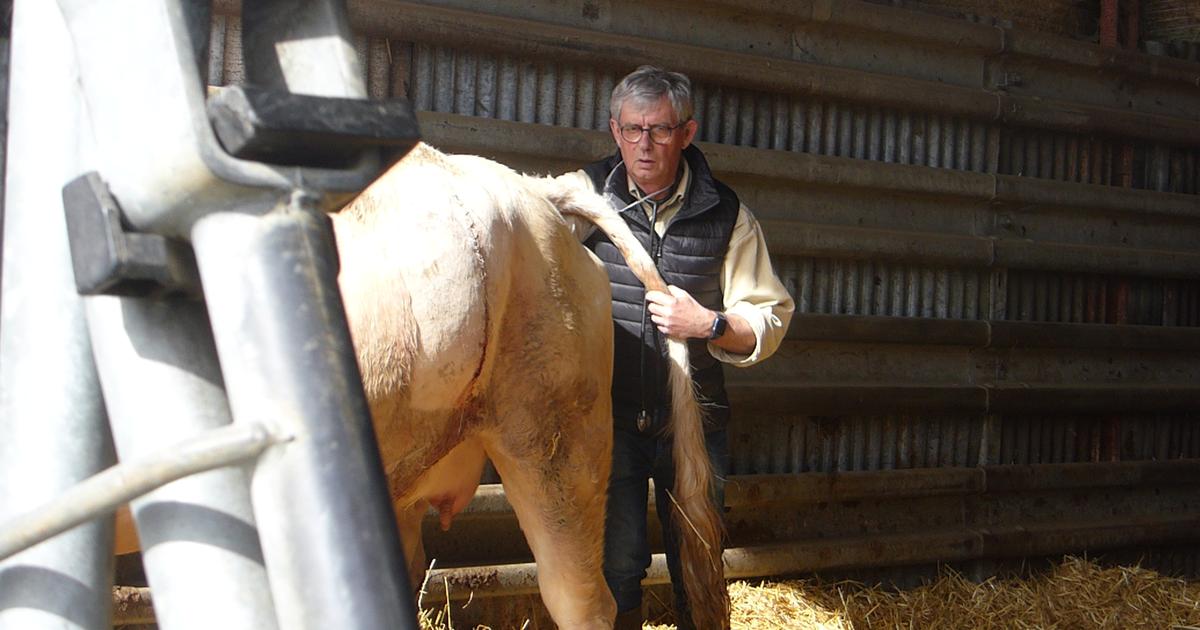The new Veterinary Drugs Act is causing a great deal of excitement among livestock owners and veterinarians.
For many reasons.
Dachau - Time-consuming bureaucracy is feared, and the bottom line is that animal welfare suffers, criticize Simon Sedlmair, district chairman of the farmers' association, and veterinarian Dr.
Wolfgang Breitner.
What will be neglected in the future is prevention so that the animals do not get sick in the first place.
The veterinary office can appoint another veterinarian to check
When the flu breaks out in a group of calves on a dairy farm, the vet has to come.
After an examination, the veterinarian decides which drug he thinks is right.
If it is injected into the sick animals, fill out the veterinary treatment and delivery receipt.
At least that's how it was until the end of last year.
According to the new Veterinary Medicines Act, the veterinarian is now obliged to enter this data in state-monitored control lists if he has administered an antibiotic to the animals.
If this is too common and exceeds certain nationwide ratios, the pet owner must take action aimed at reducing antibiotic treatment.
The responsible veterinary office becomes active - and can call in another veterinarian for monitoring and control.
The amendment to the Veterinary Drugs Act has been in force since January 1st.
According to the Ministry of Agriculture, the aim is to better record and permanently reduce the use of antibiotics in agricultural operations.
Veterinarians are sharply critical.
"The law provides for immense documentation and reporting obligations for veterinarians that go far beyond the EU requirements," complains the Bavarian State Chamber of Veterinarians.
Livestock owners fear controls by the veterinary office, higher costs - and a danger to animal protection and animal welfare.
Farmers and veterinarians in the Dachau district worried: "Confused and worried"
"I notice that the farmers are very insecure and worried," reports Simon Sedlmair, district chairman of the Bavarian Farmers' Association in the Dachau district.
It's no different for him: Sedlmair runs a modern dairy farm with 270 places, with a playpen and outdoor area, lying mattresses, brushes - the focus is on animal welfare.
With the change in the Veterinary Medicines Act, Sedlmair fears that some animals will be deprived of the right medication - on the one hand because the pet owners want to avoid being entered in the control lists, on the other hand because veterinarians now prefer not to administer antibiotics in order to avoid the bureaucracy - although it might be the right medicine for the sick animal.
The result: the animal suffers.
"Animal welfare is no longer the priority," says Sedlmair.
Ludwig Schmidt runs a business in Tander, he has 85 dairy cows with offspring.
He is already noticing that the relationship of trust between him and his veterinarian is broken.
"My vet no longer gives antibiotic dry off." Dry off means ending lactation.
During this time, the cow's udder can recover, but the time carries a great risk of infection.
The administration of antibiotics is intended to ensure udder and animal health.
"For me it's a lottery now whether drying off works or not," says Schmidt.
Bavaria: Veterinarian fears for the future of his profession
"The law is a mistake!"
Wolfgang Breitner simply fears for the future of his profession.
He runs a cattle practice in Unterschweinbach, near Pfaffenhofen an der Glonn, just across the district border.
He and his five colleagues look after over 200 companies in the surrounding districts.
With the new law, a "bureaucracy monster" is coming at the veterinarians, which is stealing them valuable time.
"As a veterinarian, I would rather work as a veterinarian than as an accountant," says Breitner.
You can read more news from the Dachau region here.
Because the best way to reduce the use of antibiotics is prevention: better site management, advice on feeding and optimization of housing conditions, milking hygiene - "this is how you can identify and avoid diseases in dairy farms at an early stage!" But there was no more time for that.
Not to mention that the younger generation is deterred by the documentation requirement – Breitner offers training to become a specialist veterinarian in his practice and provides internships for veterinary students.
Breitner is of the opinion that the state is interfering too much in the veterinarian's trade with the new law - especially since the amount of antibiotics used in veterinary medicine has been reduced by more than 60 percent in the past ten years.
In his eyes, the change in the law was made “not with reason, but with ideology”.
"A veterinarian can decide for himself whether he has to give antibiotics or not." He always has animal welfare and animal protection in mind.
For example, it could be more animal-friendly to inject a calf only once with a preparation that has a longer effect - instead of several times a week with a different antibiotic.
The crux of the action plan
Just as in human medicine, in veterinary medicine one cannot completely prevent the use of antibiotics for certain diseases.
Animal owners must draw up an action plan together with the veterinarian to reduce the use of antibiotics once a certain amount of antibiotics has been administered.
This plan must be submitted to the veterinary office, which can call in another veterinarian to check the measures.
Another point that angers veterinarian Breitner: "I don't see the focus of my work in monitoring my colleagues.
The situation, which is already tense due to a lack of young people in livestock practice, is exacerbated by such additional tasks.”
Understanding of higher vet fees
The fact that the vets now have more bureaucracy is of course reflected in the costs: Veterinarian Breitner is considering hiring an additional person to enter the data in the checklists.
The costs for this would ultimately be passed on to the pet owners - who, according to the new fee schedule for veterinarians, have had to pay more for each treatment since the end of November.
"But we understand that the veterinarians also have higher costs," says the farmer's chairman.
Livestock owner Schmidt also understands, “but I also hope that consumers will understand that milk is becoming more expensive”.
It is important to Veterinär Breitner that the prices for pet owners remain fair.
"Because the schedule of fees is designed in such a way that the prices can also be set fairly."
Our Dachau newsletter informs you regularly about all the important stories from your region.
Sign up here.















